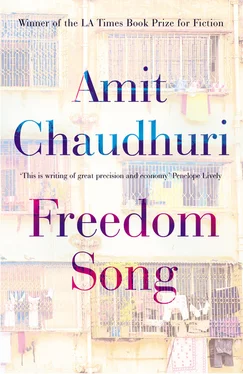Almost everyone was awake, moving in that dreary somnolent state from wash-basin to toilet to wash-basin, except the young man. His father — Khuku’s brother who, wearing a pullover and tennis shoes, had just returned from a walk by the lake, was now climbing the stairs, singing, and hesitating between one step and the next to repeat a particular note till he rendered it as he desired. With a grunt of finality, Bhaskar threw off, in a storm, the blanket and sat upright. Then, as if he were some kind of new-born animal, he propelled himself on his bottom to the edge of the bed, his legs sticking out before him like two huge talons. ‘Haridasi,’ he shouted. ‘Bring tea!’ Is that Bhaskar? thought his mother, downstairs. Though fourteen years had passed since his voice had changed to a man’s voice, a tenth of a moment always elapsed before his mother adjusted herself to her son’s grown-upness. Without a word, standing by the edge of the bed, Bhaskar began to do a quick, abbreviated version of his exercises, recommended to him by a physiotherapist for his back-ache, breathing in quickly, bending hurriedly to clutch his knees, as if they were about to desert him, and then expiring in relief. Piyu, his sister, supporting her weight on one leg, was brushing her teeth furiously and rhythmically, and observing him closely; she had been standing there and brushing for a full minute, till her teeth had been lost for the Colgate foam forming at her mouth.
‘Dash oh do yoo ayi goo,’ she said.
‘What?’ said Bhaskar, looking sideways from his ostrich posture, his head hanging between his knees.
She went to the wash-basin and spat, and then rinsed her mouth thoroughly, blowing her left cheek first and then her right. Returning, she repeated:
‘That won’t do you any good.’
‘You mind your own business,’ said Bhaskar, and bent down again.
She went away, hurt. And when his conscience was satisfied, Bhaskar rushed to the alna and began to look for his jeans among the silently hanging clothes. ‘Where is it, where is it?’ but the clothes would give no answer. Then he found them and wore them hurriedly, clamping his lower lip with his teeth as he strove to push a button through a button-hole, but zipping the fly effortlessly. He slipped off his crumpled kurta and put on a pink one. A children’s song was coming from the radio in the next house: ‘Sajalpurer kaajal meye naite nemechhe,’ sung in a ringing, girlish voice. From the walls above the faces of his mother’s parents gazed at him, she with the sari’s aanchal draped about her head and smiling slightly, he serious and patriarchal in a white kurta, his skin even darker than Bhaskar’s. Morning came to the house through the windows at the back of the second storey, via a school in a field and a doctor’s house; when a shutter was opened, the light found its way straight to one’s eye. By this time mynahs, shaliks, sparrows, crows, had begun to echo on parapets and window-sills, and a cat had woken up and fallen asleep again.
The doorbell rang, and Bhaskar’s mother wiped her brow with her sari and proceeded towards the veranda. Looking past the branches of the shajana tree, she saw Mohit between their gaps, no longer wearing shorts, but trousers, standing with his bicycle on the pavement. Four days ago he had completed his end-of-term exams, for which he used to study alone early in the mornings. Today, he had woken up at five as usual, had a bath, wished his mother goodbye, and come cycling to Vidyasagar Road.
‘Ei, Mohit! What do you want?’
‘What do you mean, what do I want?’
‘You want to come in?’
Mohit stood with one hand on the bicycle. The road was misty behind him.
‘Yes, I want to come in,’ he said sternly.
‘Wait there,’ said his great-aunt, and wandered inside, smiling. ‘Haridasi!’ she called.
‘Yes ma,’ came the small, childish voice from the kitchen.
‘Open the door outside for Mohit.’
A minute later, coming up the stairs, Mohit found Piyu standing on the first-floor landing.
‘How was the ride?’ she asked. After Mohit had grown an inch last year he was as tall as her and could look her in the eye.
‘Fantastic! I came through the lake.’
His great-aunt began to follow him around like a mendicant.
‘Will you have luchi, Mohit?’ she asked.
‘No,’ he said.
‘Omelette?’
‘No.’
‘Pithha? Have a pithha. I made them yesterday.’
‘No,’ said Mohit firmly, as if he were used to warding off such requests. ‘In fact, I just had something before I came here.’ His hair was still gleaming from the bath he had had half an hour ago.
‘What did you have?’
‘Oof! What a question,’ said Mohit, looking ashamed. ‘Milk and toast and roshogolla,’ he admitted with a mixture of bravado and embarrassment.
‘Would you like a cup of tea?’ asked Piyu.
Mohit hesitated; for it was a sign of adulthood to drink tea, and he was tempted, in his great-uncle’s house, to partake of a pleasure denied him by his mother.
‘All right!’ he said impatiently, not looking at anyone in particular. ‘All right, I’ll have tea!’
When Bhaskar came into the dining-room in his jeans and pink kurta, tea was still brewing in the pan. Mohit was discussing irrelevancies with his great-aunt and Piyu, his elbows resting on the table, his legs locked around one of the legs of the dining-table. So secure did he look that it seemed no buffeting of fate could move him from his place. Pigeons, in a mire of feathers and excrement, had begun to make crowded noises in a dark foot-wide corridor by the water tank of the next house, which was perpetually visible from the window next to Mohit. But Bhaskar first entered the kitchen and said resentfully:
‘Half an hour and you still haven’t made it! Dhur — now I don’t want it.’
Poor eleven-year-old Haridasi, she took everything literally; her mouth curved downward. She stood on tiptoe and strained to gaze at the pan.
‘What could I do?’ she said softly. ‘I had to open the door for Mohitda.’ She said, ‘Don’t go, Bhaskarda, it’ll be ready in a minute.’ The smell of tea, strong and bitter-sweet and a little rancid, like sweat, had begun to waft through the kitchen.
But Bhaskar had, without pause, already walked out of the dining-room, saying, ‘I’ll be back in an hour.’ Piyu, still hurt from his retort ten minutes ago, decided she had not heard this. ‘What about your tea?’ called out his mother. When he did not answer she said to the table, ‘Let him do what he likes.’ Piyu lifted herself from this scene as if it did not matter. Then Mohit disrupted the small dining-table community further by getting up and shouting, ‘Bhaskarmama, wait for me, I’m coming.’ ‘Ei, where are you going?’ asked Piyu in astonishment. Deserting them, he revealed, ‘With Bhaskarmama!’ Bhaskar’s father had emerged absent-mindedly from the toilet and was washing his hands with a piece of Lifebuoy soap. ‘Where are you going?’ he asked. Running down the stairs, Mohit said, ‘With Bhaskarmama!’
When Mohit caught up with him on the pavement, he said: ‘Bhaskarmama, I’m coming too.’
Bhaskar put an arm around the boy, who was a little out of breath, and said, ‘Then come; I don’t mind.’ Two pigeons, making rapid pistol-like sounds with their wings, took off over their heads.
Now, at half-past six, two state transport buses went down Ishwar Chandra Vidyasagar Road, blowing their loud hooting horns; they were half empty, an unusual sight. There was a small encampment of rickshaws along part of the pavement, their extended arms planted on the ground, their collapsible roofs raised, their wheels at rest; rickshaw-wallahs, heads and shoulders covered with a piece of cloth, were slapping their hands in imitation of applause and hurling tobacco into their mouths. Retired men, as free as children, all of them dressed for some reason in white dhoti and kurta, were either creeping out of their houses or returning from a walk, with or without a walking-stick. The first to go about their business were the crows, clamorous, a little neurotic, turning up, as usual, by the tea-shop entrance (if one could call that absence in the wall an entrance), by the lane’s rubbish dump, on the pavement, upon the roofs. Fog, a compound of charcoal smoke, exhaust fumes, and mist, hung in the lanes; you did not notice it at close quarters, but, a little distance away, you saw it loitering by balconies and doorways. The colours of the houses on Vidyasagar Road, pink, or moss green, or light yellow or blue, were dimmed by the mist, till they looked like the colour of old cotton saris that have been worn for many years and still not thrown away.
Читать дальше












